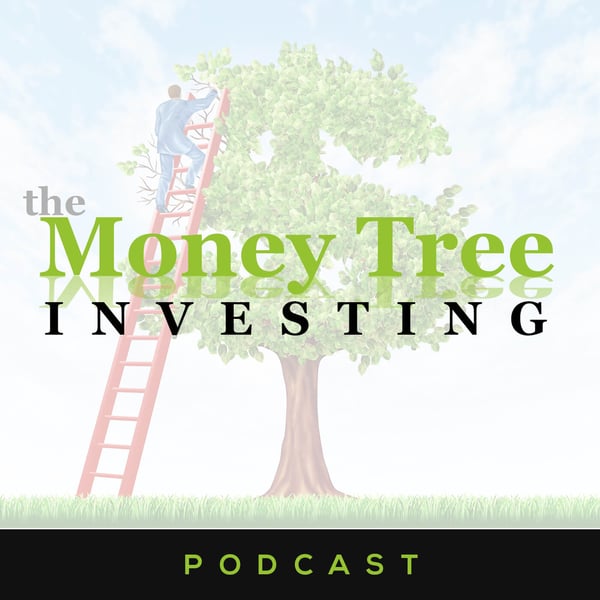All Weather Investing Strategies
Money Tree Investing
Money Tree Investing Podcast
4.6 • 658 Ratings
🗓️ 24 January 2025
⏱️ 59 minutes
🧾️ Download transcript
Summary
Eric Crittenden is here to share the investing strategies for all weather! No matter what the situation is, you should be prepared to invest your money wisely. Eric shares insights on blending equities, bonds, and systematic global macro strategies like trend-following to navigate volatile markets, emphasizing the importance of managing downside risk and incorporating uncorrelated assets. We also reflect on macroeconomic trends, and compare today’s inflationary pressures to the 1970s, expressing skepticism about inflation being fully contained and stressing the value of systematic investing over reliance on media narratives or short-term predictions. Today we discuss... Eric Crittenden, CIO at Standpoint Asset Management, specializes in "all-weather investing," combining hedge fund styles and traditional assets for stable returns in all market conditions. Eric's career began after transitioning from meteorology and public health studies to finance, spurred by a fascination with dynamic systems and risk management. He highlights the importance of managing downside risk and diversification, especially during challenging periods like the stagflation of the 1970s. Crittenden cautions against high-fee hedge fund structures, advocating for in-house, low-cost implementation of trend-following strategies. Gold, short-term fixed income, and systematic macro strategies are recommended for navigating inflationary and stagflationary periods. Rather than relying on narratives, Crittenden employs a systematic, data-focused method to identify global trends using daily updates from international futures exchanges. Current economic conditions are compared to historical eras like the 1970s, the Great Depression, and early 2000s, predicting major challenges in the next 10–15 years. Inflation could resurface due to supply chain disruptions, reindustrialization, or unexpected events rather than monetary policy alone. Decoupling from China and reindustrialization in North America are significant but costly, long-term efforts requiring high capital expenditure. Predicting economic shifts remains challenging as market shocks often come from unforeseen factors. Reindustrialization and reshoring initiatives face efficiency and scale challenges, particularly when transitioning manufacturing from China to smaller nations like Mexico or Vietnam. The U.S. benefits from unparalleled geographic advantages, which foster economic resilience and attract global talent. Technological shifts like AI and crypto are reminiscent of the early internet, with a mix of revolutionary potential and speculative overreach. Governments may challenge crypto through taxation or legal constraints, highlighting the importance of considering geopolitical risks in such investments. Long-term capital stewardship prioritizes sustainable growth, stability, and client trust over speculative gains or first-mover risks. For more information, visit the show notes at https://moneytreepodcast.com/investing-strategies-eric-crittenden-680
Transcript
Click on a timestamp to play from that location
| 0:00.0 | Welcome to the Money Tree Investing Podcast. |
| 0:04.0 | Stock market, wealth, personal finance, value stocks, invest in your life. |
| 0:10.0 | Hello, Smart Money Tree Podcast listeners. Welcome to this week's show. My name's Kirk Chisholm and I'll be your host. So today I'm joining with Eric Crittenden. How you doing to Eric? |
| 0:18.0 | I'm good, Kirk. I Want to bring Eric on some fascinating |
| 0:21.7 | stuff we're going to be talking about today. But before we begin, Eric, tell us a little bit about |
| 0:25.5 | your background. I am the chief investment officer at standpoint asset management. We are an |
| 0:30.7 | alternative investments firm that focuses on what I would characterize as all-weather investing. |
| 0:36.1 | So essentially, we mix different hedge fund styles together with traditional assets in pursuit of stable, |
| 0:44.3 | what I would like to characterize as reasonable returns, regardless of market conditions. |
| 0:49.0 | That's our goal. |
| 0:50.4 | I studied meteorology in college and public health and quickly realized there was no money. |
| 0:55.0 | I knew that those two industries took an elective in economics, fell in love with dynamic systems, |
| 1:01.4 | transitioned over to finance, and studied some computer science, and then entered the world, |
| 1:06.1 | kind of like you did in late 99 is when I became a money manager. |
| 1:10.3 | Learned some very valuable lessons about risk |
| 1:12.3 | management, investor behavior, investor psychology. And over the next 25 years, tried to take that |
| 1:20.0 | knowledge, converted into wisdom, and run, well, diversified global portfolios for myself and |
| 1:26.4 | clients. |
| 1:30.7 | Well, it sounds like in college you did a little bit of a lot of things. |
| 1:32.1 | Yeah, a lot of migration. |
| 1:34.2 | I was in college for nine years. |
| 1:34.5 | Wow. |
... |
Please login to see the full transcript.
Disclaimer: The podcast and artwork embedded on this page are from Money Tree Investing Podcast, and are the property of its owner and not affiliated with or endorsed by Tapesearch.
Generated transcripts are the property of Money Tree Investing Podcast and are distributed freely under the Fair Use doctrine. Transcripts generated by Tapesearch are not guaranteed to be accurate.
Copyright © Tapesearch 2025.

